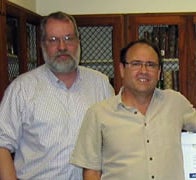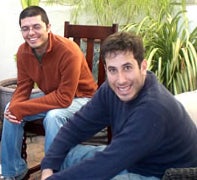- Partnership for Mental Health Conference 2010
- Center for Social Medicine and the Humanities
- History of Mental Health and Neuroscience Archive
- Learning from the life and research of Elyn Saks, JD, PhD
- Los Angeles County Homeless Child Study
- MHSA Evaluation
- MHSA Evidence-Based Practices Evaluation
- Peer Workers in Mental Health: the Employed Consumer Study
- Robert Wood Johnson Foundation
Partnership for Mental Health Conference 2010
On May 21, 2010, UCLA and LAC-DMH jointly sponsored the Partnership for Mental Health Conference at UCLA. In the morning session, a small group of distinguished speakers presented recent and cutting-edge research studies on mental health programs and outcomes. In the afternoon, Los Angeles, Orange, Riverside, San Diego, San Luis Obispo, Santa Barbara, and Stanislaus Counties presented their MHSA programs and results. California State Director of Mental Health Steven Mayberg, Client Coalition leader Catherine Bond participated in a dialogue about the meaning of recovery; and five County Mental Health Directors presented their thoughts on the next steps forward. The evening program featured presentations by former Los Angeles DMH Directors JR Elpers and Areta Crowell, and health management consultant Alicia Smith. Several of the slide presentations from the conference are available via the links below.
Center for Social Medicine and the Humanities
The History and Social Studies of Medicine Program is a community of scholars using a diverse set of research methodologies to understand the health and medical problems of today within their historical and sociocultural context. Our programs include field and archival research, the development of archival collections, the creation of educational websites, the sponsorship of fellowships and of lecture and seminar programs. Through our research and collaborative projects, we seek to better understand and evaluate the best practices for providing health services in Los Angeles, by uniting the expertise of academic historians and social scientists with the experience of health providers and policy makers.
The program is led by Philippe Bourgois, PhD, Joel Braslow, MD, PhD, and includes Enrico Castillo, MD, Ippolytos Kalofanos, MD, PhD, Marcia Meldrum, PhD; Sarah Starks, Program Scientist; and Russell Johnson, History of Biomedical Sciences Archivist; Ronald Calderon, Staff Research Assistant.
Visit our websites at: hssm.semel.ucla.edu, leorangell.org, and cshn.pendari.com .
Our major projects in 2020 include:
1) a multi-year evaluation and study of the implementation of Assisted Outpatient Treatment in Los Angeles County.
2) the Rangell Project to bring psychoanalysis into the 21st century through seminars and research collaborations.
3) the Mental Illness and Incarceration Conference scheduled for April 18, 2020
4) an essay history of the Society for Neuroscience 1969-2019 and a supporting multi-media website
| Attachment | Size |
|---|---|
| 8.3 KB |
History of Mental Health and Neuroscience Archive
Learning from the life and research of Elyn Saks, JD, PhD
Los Angeles County Homeless Child Study
The Los Angeles County Homeless Child Study, conducted by Dr. Bonnie Zima, in 1990-91, interviewed 169 children ages 6-12 living in 18 homeless family shelters in the County and their parents. Dr. Zima identified high unmet needs for mental health care among the children, 78% of whom suffered from depression, a behavioral or learning problem, and among their mothers, 72% of whom reported some level of psychological distress or substance abuse. Few of these mothers at the time were receiving services, a situation which has improved somewhat in the intervening 20 years, as a result of current outreach programs.
| Attachment | Size |
|---|---|
| 285.84 KB | |
| 10.82 KB | |
| 286.32 KB | |
| 1.98 MB |
MHSA Evaluation
This five-year NIMH-funded study of the implementation of MHSA in Los Angeles County is led by Deputy Director Dr. Kathleen Daly, Dr. John Brekke of USC, and Dr. Joel Braslow. The goal is to understand how MHSA policies affect client treatment and outcomes, staff practices and morale, and improve mental health services. Research teams of ethnographers and consumer specialists have been embedded in the culture of specific DMH clinics for a period of three and a half years, observing and conducting interviews with administrators, stakeholders, clinicians, staff, and clients. Clinicians, staff, and clients are also completing surveys about their experiences and attitudes. The research team is now in the preliminary stages of compiling and assessing the data.
MHSA Evidence-Based Practices Evaluation
The goal of this project is to assess the Mental Health Services Act (MHSA) Prevention and Early Intervention (PEI) implementation of evidence-based practices (EBPs). The specific aims are to: 1) Characterize and operationalize Los Angeles County Department of Mental Health (DMH) criteria for successful implementation of EBPs. 2) Based on the criteria determined in Aim 1, determine obstacles to successful implementation of selected PEI EBPs. 3) Characterize and assess the reasons for optimal or less than planned outcomes for implementation of selected EBPs. 4) Provide recommendations for improving the process of stakeholder-driven decision-making that is balanced with fiscal and practical realities.
Peer Workers in Mental Health: the Employed Consumer Study
The 2011 Employed Consumer Study is a qualitative evaluation of the work mental health consumers perform in in LACDMH clinics; the benefits of their employment, to the consumer employee, to the clinic staff, and to other mental health clients; and the impact on institutional stigma.
| Attachment | Size |
|---|---|
| 189.42 KB |
Robert Wood Johnson Foundation
The Robert Wood Johnson Foundation provided key support for this website through a 2010-13 Investigator Award in Health Policy Research to Joel Braslow and co-investigator John Brekke of the University of Southern California. Visit www.rwjf.org to learn more.



